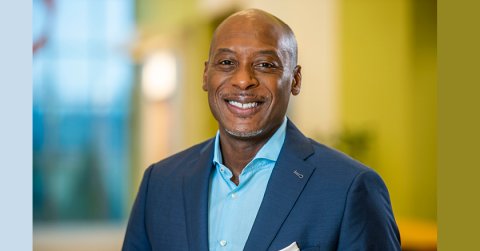
SAS’s Reggie Townsend on why responsible innovation, digital literacy, and empathy are essential to the UAE’s AI-driven future.
Reggie Townsend, Vice President of the SAS Data Ethics Practice, is at the forefront of global conversations on responsible AI. From advising the White House as part of the US National AI Advisory Committee to guiding strategy at EqualAI, he champions the need for human-centred innovation. Speaking at the WHX Tech – EHS AI Summit 2025 in Dubai, Townsend underscored how technology must serve people, not overshadow them. In this exclusive conversation, he reflects on the UAE’s digital-first ambition, the importance of inclusivity in AI, and the role of future generations in shaping a balanced, equitable tech era.
Interview Excerpts:
The UAE is clearly embracing a digital-first nation approach. But such a vision cannot succeed unless we understand how data is evolving, what practices we must adapt, and where the region is heading. Along with innovation comes the responsibility of embedding sound data practices into operations. What are your comments on this?
Digitalisation is both imperfect and impersonal. On the positive side, it drives efficiency — accessing government services via an app is far easier than travelling to an office, and digital healthcare interactions are often more convenient. But digitisation also creates a permanent record of our existence. That raises deep philosophical questions about privacy, transparency, and anonymity. Cybersecurity has shown us that data can be used for both legitimate and illegitimate purposes. Becoming a digital-first nation doesn’t mean we should stop — it means we must be deliberate, mitigate risks, and innovate responsibly.
When was your first visit to the UAE, and how do you perceive the change over time?
My first visit was about three years ago, just after the pandemic. The energy then felt more subdued. This time, there’s a palpable sense of purpose. People are moving with intent, and conversations around AI reflect excitement, urgency, and vision. It’s refreshing.
How does the UAE compare with other developed markets in terms of digitalisation and AI adoption?
Comparisons can be tricky. Different cultures take different approaches — some are cautious, others push ahead without restraint. Neither is right or wrong; it’s about sovereignty and cultural choice. That said, AI is a ubiquitous technology, much like electricity. Over time, even those who resist will be touched by it. I call this “AI-fication.” What stands out in the UAE is its focus on digital literacy. Ensuring citizens have foundational knowledge — not necessarily becoming data scientists, but being able to make informed choices — is crucial. That approach is commendable.
What advice would you give to Gen Z, Gen Alpha, and soon Gen Beta as they navigate this digital era?
I tell young professionals to remain curious, think critically, and ask “why” three times. Most importantly, remain human — nurture empathy and connectedness. Technology should augment humanity, not strip it away. We’ve already seen unintended consequences from social media. With AI, the stakes are higher. We mustn’t prioritise only efficiency and profitability.
“Future generations will live with the consequences of our choices, so they must be deliberate, curious, and thoughtful.”
How critical is digital literacy for shaping economies and empowering citizens, particularly in developing and fast-growing markets like the UAE?
Digital literacy is now as essential as mathematical or linguistic literacy. Since our services, economies, and even identities are increasingly digital, everyone must be literate. Not all will be fluent, but all must understand the basics. From what I’ve seen, the UAE is on the right track — training citizens and embedding AI literacy into education.
You’ve said AI should not be framed as “us versus them.” How can reframing help ensure AI benefits are shared equitably?
If AI is to benefit everyone, then more people must have a say in how it shapes their lives. Transparency and inclusivity are key. Power that is concentrated is fragile, but distributed power is sustainable. Currently, the top AI companies have market capitalisations larger than most nations. That’s power — and with power comes responsibility. For accountability, citizens need the language and literacy to question and engage. Inclusivity ensures AI reflects diverse lived experiences, not just those of a few voices in Silicon Valley.
Different countries are adopting varied approaches to AI regulation. How can organisations navigate this complex patchwork while still fostering innovation?
We already operate under different regulatory systems globally. AI will be no different. Think of electricity: standards vary, but with an adapter, the system works. Similarly, we’ll see harmonisation rather than full consistency.For cloud providers and foundation model builders, consistency will be critical. For application players like us, as long as we have the right “adapters” — APIs in today’s world — we can innovate while aligning with local standards.
Beyond compliance, how can AI governance unlock innovation?
Governance and enablement must go hand in hand. Take model cards, for example — they help assess whether models drift, contain bias, or are being used within the intended scope. These tools support transparency and trust, and they’re being adopted across sectors from life sciences to consumer goods. Governance enables responsible scaling of innovation. What role do responsible innovators — whether individuals, businesses, or governments — play in embedding safeguards while empowering people?
Innovation is not confined to labs — we are all innovators. Responsible innovation begins with asking: For what purpose? To what end? And for whom might it fail? If we answer these questions thoughtfully, AI can be used in ways that benefit humanity without harm. That’s the essence of responsible innovation — balancing risk management with human empowerment.
Do you personally disconnect or “digitally detox”?
Yes, in small ways. I don’t abandon everything, but I sometimes leave home without my phone. Growing up without the internet or mobile phones, this feels natural to me. For younger generations, it’s far harder. For me, a run followed by quiet time near water is enough to recharge.
Balance matters — the world won’t collapse if you miss an email!





